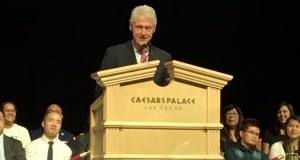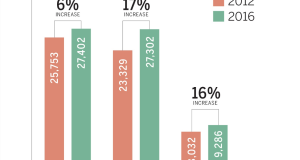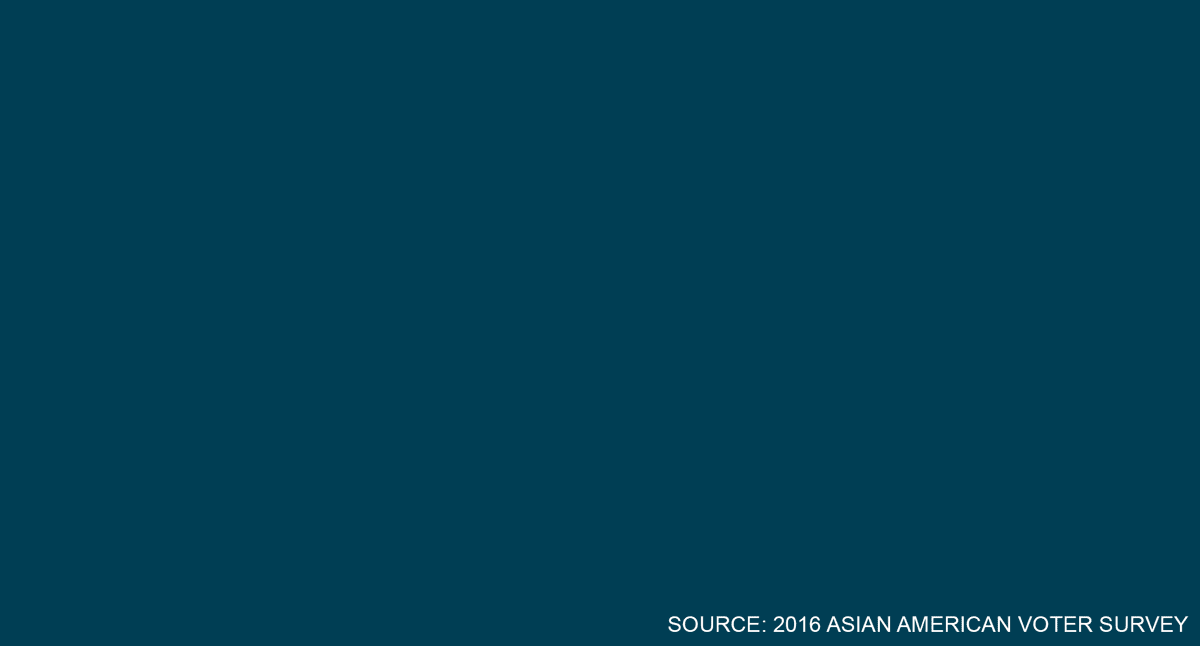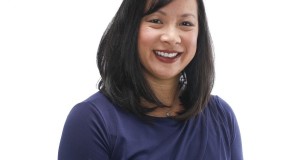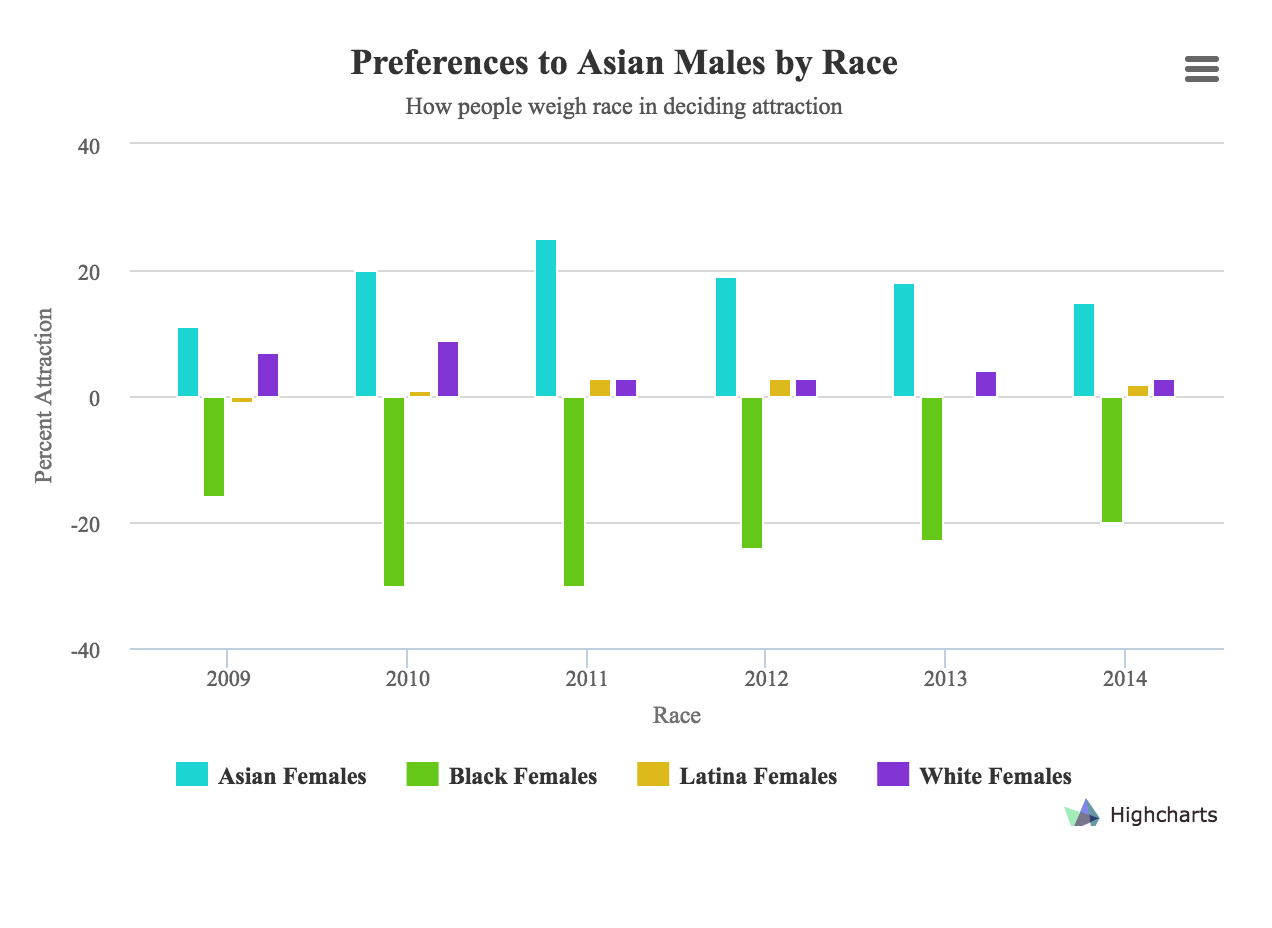
The data represents how attractive females find the average guy. For example, in 2009, black females found Asian males 16% less attractive than the average guy. All data was collected from OkTrends, the research arm of OkCupid.
Online dating can be demoralizing. Its digital platform lets unnamed users unload identity-based epithets on unassuming singles, provocation not needed.
However, what may be more damaging than overt racism is the subconscious prejudice that people exhibit in the direction of their finger-swipe.
OkCupid analyzed its users actions in 2009, revealing that those looking for relationships had an overwhelming preference for others of the same race.
Black women and Asian men were penalized the most judging by the dating service’s currency: messages. The chat function is used to show a potential date you’re interested or, in some cases, belittle them.
Six years later, the analysis was run again. Little to nothing changed.
Around 30 percent of users answered “Yes” to the question, “Do you strongly prefer to date someone of your own race?” This marked a 10 percent decrease from 2009. While that may seem like a significant change, the behavior on the app did not reflect participants’ answers: black women and Asian men were consistently the least interacted with on dating apps.
This data isn’t restricted to users on OkCupid. Other dating websites also find that their users are filtering matches based on race, according to the data from OkCupid. Additionally, this trend has been studied extensively. Researchers from Yale University, Microsoft, and Harvard University published a study in Sociological Science that suggests that while everyone seems to be practicing race-based discrimination on dating apps, conservatives are more willing to admit that they want a partner of the same race. Furthermore, the data collected from a study done at Columbia supports the idea that the racial makeup of a user’s ZIP code can influence their choice.
This phenomenon replicates itself on dating websites that don’t cater to primarily to a straight consumer. Asian users on Grindr, a popular dating and hookup website for gay, bisexual, and queer men, also experience discrimination.
Paul Sirisuth, a gay Asian man living in New York, said his race has been a large part of his experience on dating apps.
“I get messages from guys that love Asians coined ‘rice queen’ and go after men that are Asian exclusively and others that don’t like Asians at all and label me as fem,” Sirisuth said. “One time, I was labeled as an animal eater because [the other user] was under the impression that Asians are ‘savage’.”
However, online dating doesn’t mean bad news for all Asian men, especially when the format of the dating app is non-traditional. Nathan Ong, an Asian male from Maryland, found his fiancé on Coffee Meets Bagel, an app that sets users up with mutual friends. Their online romance that began last year will culminate in their wedding on October 15.
Ong’s fiance was the second person he met through the app.
Ong attributes his match to a few factors, including Coffee Meets Bagel’s algorithm that pairs people up based on friends of friends on Facebook.
“Other websites rely on the user to click through pages of people and I think that in someway emphasizes the physical appearance,” Ong said.
Ravi Mangla, freelance writer and author of Understudies, wrote about this issue for Pacific Standard. Mangla noted how even the name of an Asian American might work against someone on an online dating platform.
“First impressions on dating websites usually amount to name and image, so having a non-anglicized name gets that person labeled as ‘other’ right off the bat,” Mangla said. “It builds an immediate cultural barrier that has to be scaled.”
Mangla briefly considered going by Rob.
“As a teenager, I was intent on changing my name,” Mangla wrote in his piece for Pacific Standard. “I believed a Western name would help me to pass for someone other than what I was.”
Mangla ultimately decided against modifying his name. However, this sentiment, which is felt too often by Asian Americans, is reflected in data collected from an online dating app, Happn, that showed that the more popular names on online dating were Western names, like James and Richard and Sophie and Sarah.
A solution to this issue may not exist. However, Mangla suggested people apply a form of the NFL affirmative action policy known as the Rooney Rule when dating, which could ensure that every so often, someone goes on a date with someone of a different race.
“I’m not sure practicing the rule would do away with ingrained racism, but I think it would build understanding and make people more cognizant of their own biases,” Mangla said.
 VOICES Publishing from the AAJA National Convention
VOICES Publishing from the AAJA National Convention



